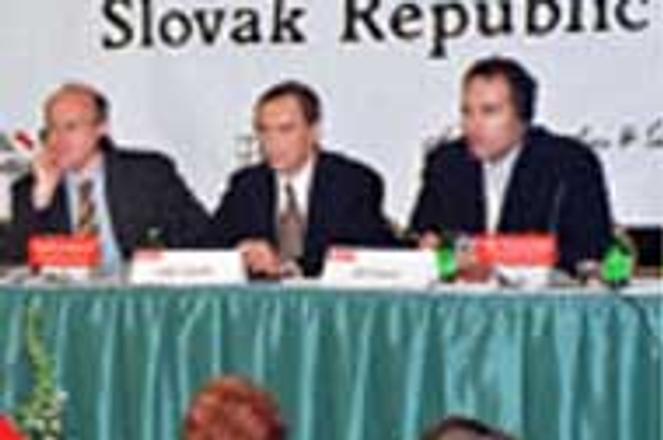Even the Economist investment conference in April was unable to reassure small investors that the state is listening.photo: TASR
Representatives of the nine foreign Chambers of Commerce operating in Slovakia, representing over 500 foreign firms doing business here, are to meet on June 21 to prepare a shortlist of measures they feel would improve the business environment for small and medium-sized foreign investors.
The list is to be submitted to the government, and chamber officials say they hope it will lead to a fruitful dialogue with cabinet ministers on topics as diverse as taxes, privatisation and bankruptcy law.
"We hope to present something that will help everyone," said Fabrizio Paoletti, general secretary of the Italian Chamber of Commerce. "The problems faced by Italian entrepreneurs are those faced by all foreign enterprises in Slovakia. We want to create a lobby for all foreign entrepreneurs."
The groups involved in the initiative include the British, Dutch, Danish, Austrian, American, German, Italian, Swedish and French Chambers of Commerce.
Paoletti said the June 21 summit was to be only the first in a series of joint meetings between the chambers. "We intend to continue our consultations," he said, explaining that a joint committee of representatives from all nine chambers would be formed, and would offer expert assistance to the government in shaping policies to attract investors.
Judging from the early reactions of government officials, the chamber initiative is likely to get a warm reception from the cabinet. Vladimír Zlacký, an advisor to Deputy Prime Minister for Economy Ivan Mikloš, said that "the government would like to see feedback from foreign investors doing business in Slovakia," and added "it would be extremely helpful if the business community responded with concrete proposals and help."
Misguided incentives
The co-operative drive was launched in early April, soon after the government unveiled its investor incentives programme. Representatives of the British, Italian and Danish Chambers of Commerce said they felt the cabinet's incentives were too narrowly focussed on large foreign investors, and that they failed to address the concerns of smaller foreign firms and investors already doing business in the Slovak Republic.
"The government's incentives programme is in a certain sense discriminatory towards smaller firms trying to start or run a business in Slovakia," said Lívia Eperjesiová, executive director of the British Chamber of Commerce.
The incentives package stipulates that as of April 1, a minimum investment of 5 million euros is required to qualify for a five-year tax holiday, unless the investor puts his money in the tourist industry or an area of high unemployment.
"One of the biggest problems of the incentives package is that it only applies to new companies," said Martin Tordsson, executive director of the Danish Chamber of Commerce. "Companies established even in the last year don't qualfy for the incentives."
"One has to ask whether it's better to have tax holidays or a stable business environment," added Eperjesiová.
Zlacký said he agreed that the government's incentives programme could have done more for small and medium investors. "In my personal view, the investment threshold should have been set lower to assist smaller enterprises," he said. "We can't expect a huge inflow of large investors into this region at the moment."
Canvassing investors
Eperjesiová's April 13 meeting with Paoletti, and subsequent meetings between the Italian, American and French Chambers of Commerce, produced a preliminary list of economic problem areas confronting the government in creating a stable business environment. The list includes topics as various as difficulties in collecting and securing debt, problems in registering companies, tax anomalies and import restrictions (see box this page).
Between now and the June 21 general meeting, Eperjesiová said, "we have to ask our members what problems they consider the most serious." Once the results of the surveys are collated and discussed, a list of five or six problems will be prepared by each chamber and then mooted at the joint meeting.
"We're all in this together," said Denmark's Tordsson. "If we come up with five or ten really good improvements, it [changes in the business environment] might happen quite quickly."
Chamber officials stress that their co-operative effort is not just a one-way street, and that dialogue with the government will help foreign investors understand the limitations the government is working under at the same time that it helps the government understand the needs of investors and how to respond to them.
The government, too, claims that it is listening closely to the business community. Zlacký said that cabinet is set to discuss a plan to lower corporate income tax in early June, and reported that "the current thinking is that these tax cuts would take effect January 1, 2000."
As for improvements to the wider business environment in Slovakia, Zlacký said, "the government's administrative capacity and its expertise is limited... any expert help from foreign investors, especially at the bureaucratic level, would be extremely welcome."
Proposed points for discussion:
Difficulties in collecting and securing debt
Difficulties in registering companies
Difficulties in the bankruptcy process
Tax anomalies and high tax rates
Problems in acquiring real estate
Certification process
Residency and registration process
Employee absenteeism and labour code
Lack of transparency in privatisation
Source: Danish Chamber of Commerce



